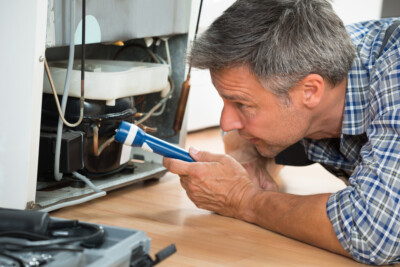My Refrigerator Stopped Running, No Sound?
A refrigerator that has stopped working and does not make any sounds probably has a damaged compressor. If you know that your refrigerator is not working properly, you may conclude that the problem is with the compressor. If one of the fans fails or the compressor is turned off, the refrigerator will cool little or no cooling at all.
If you can hear the compressor running but the refrigerator is not cooling, the problem is most likely frost-clogged evaporator coils or a blocked or broken evaporator fan. If you feel like the compressor is running but your refrigerator isn’t cooling, or you feel like it’s running all the time without shutting off, the problem is likely with the compressor. If the compressor motor seems to be running, humming, or making some sort of noise, but the refrigerator isn’t cooling at all, it’s time to call a service technician.
If the fans run but the compressor does not start, or if you hear a click from the unit, check the overload relay for signs of overheating or sparking. If your refrigerator clicks or if the compressor does not start even though you can hear the fans running, the overload relay may be arcing or overheating.
If you can hear air moving and the evaporator fan running, you should check the refrigerator compressor. Refrigerator compressors do not run all the time, but turn on when the temperature inside the refrigerator exceeds a certain level.
The refrigerator compressor is the condenser coil that releases the heat from the refrigerator into the room. The condenser is a heat exchanger that absorbs heat from the inside and cools the refrigerator.
The freezer compartment has an evaporator fan that blows cool air from the freezer compartment to the refrigerator’s crisper compartment. Usually, the cold air produced by the refrigerator comes from the freezer compartment and then goes into the fresh food section of the refrigerator. This means that cooling is all good, but cold air can’t get into the refrigerator due to the blockage of ice.
Store food elsewhere, but for now, unplug the refrigerator and let it defrost. Now you can put the refrigerator back or wait to see if the reset works first. Be patient as you wait to see if the reset works and keep the fridge door closed so it can cool down as quickly as possible.
You can try resetting the refrigerator compressor first to see if that fixes the problem. If you reset the refrigerator, it may be enough to get the compressor back on and working properly. The thermostat controls the compressor and evaporator fan motors; so if it doesn’t work properly, the cooling system may run longer than it needs to, causing the refrigerator to overcool.
Be sure to check your refrigerator thermostat from time to time to make sure it is operating at the correct temperature. If you don’t trust the temperature readings you get, or if you have an old refrigerator without an internal thermostat, consider purchasing a separate inexpensive refrigerator thermostat (see Amazon for an example) for testing purposes.
Instead, the refrigerator may have dirty condenser coils, a door that does not close tightly, or faulty temperature control. Sometimes the refrigerator is just old, and sometimes the problem is with the motor or gasket.
Failure of any of these components or systems can cause your refrigerator to stop working. As obvious as it may seem, the refrigerator often shuts down completely because there is simply no power to it. This may seem too simple to be the answer, but a loose power cord in a refrigerator outlet or a flipped switch will shut down the entire refrigerator.
If you find that the refrigerator is plugged into a working outlet, the refrigerator switch has not worked, the cold control is set correctly, but the device still does not show signs of life, leave the door closed to keep cold air in and call a repair shop. human. If the engine is running but the temperature inside the refrigerator is above normal and adjusting the thermostat inside doesn’t solve the problem, a few things can go wrong. When the compressor is running (because the sensors inside the freezer or refrigerator compartment determine if some excess heat needs to be removed), it makes a kind of hum, just like any running pump.
The compressor is designed to regulate the internal temperature of the refrigerator by displacing the refrigerant. The compressor is responsible for moving the refrigerant in the refrigerator, which is why it creates that hum that people are used to. Refrigerator compressors force cold air through the refrigerator and push hot air out of the refrigerator using a condenser located on the back of the refrigerator and an evaporator located inside.
Depending on the age of your refrigerator, its price, and how confident you or the repair person is that the problem is with the refrigerator compressor, it may end up being cheaper to replace the unit. If you run into any of the other problems on this list and your refrigerator is over ten years old, you’ll probably save more money in the long run by simply replacing it. You can use this information to troubleshoot your refrigerator and then enter the model number in the search box to find the correct part for your refrigerator.
If you choose to fix your own refrigerator great! But we recommend using a licensed trained refrigerator repair service. For refrigerator repairs in Oklahoma City contact Appliance Repair OKC Services by calling 405-378-4566 or visit our website at https://www.okcappliance.com or also our Google business page at https://cutt.ly/YEnc8qk. Call now!
The post My Refrigerator Stopped Running, No Sound? appeared first on Appliance Repair OKC Services | Best Appliance, Washing Machine Repair Company in Oklahoma.


No comments:
Post a Comment